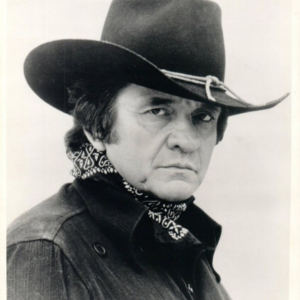
“Don’t Take Your Guns to Town” is a cornerstone in the discography of the Man in Black, Johnny Cash. Released in 1958, this song stands as a poignant narrative of youthful recklessness and its tragic consequences. It’s a tale as old as time, yet Cash imbues it with a raw, authentic power that resonates deeply.
Background
Cash, with his characteristic baritone, transforms this ballad into a haunting meditation on the destructive nature of violence. The song unfolds as a stark cautionary tale, a grim morality play set against the backdrop of the American frontier. It is a world where masculinity is often equated with bravado, and where impulsive actions can have irrevocable repercussions.
The song begins with the introduction of Billy Joe, a young man brimming with youthful exuberance and a thirst for adventure. His decision to leave the quiet confines of his rural existence for the allure of the city is a common trope in American folklore. However, Cash’s genius lies in his ability to subvert this familiar narrative by endowing Billy Joe with a fatal flaw: a penchant for violence.
Armed with nothing but a reckless disregard for human life, Billy Joe enters the city, a metaphorical lion stepping into a concrete jungle. The urban environment, with its stark contrasts to the familiar, serves as a potent symbol of the temptations and dangers that await the unwary. Cash’s vivid imagery paints a picture of a world where the law is tenuous and survival is a daily struggle.
The crux of the song lies in the tragic outcome of Billy Joe’s ill-fated adventure. His encounter with a local tough, which escalates into a deadly confrontation, serves as a stark reminder of the consequences of unchecked aggression. Cash’s delivery is imbued with a sense of fatalism, as if he is witnessing the inevitable unfolding of a Greek tragedy.
Musically, “Don’t Take Your Guns to Town” is a masterclass in restraint. Cash’s stripped-down approach, backed by a simple yet effective instrumentation, allows the lyrics to take center stage. The song’s repetitive structure serves to underscore the cyclical nature of violence, while the mournful melody evokes a sense of loss and regret.
Beyond its narrative power, “Don’t Take Your Guns to Town” also serves as a social commentary on the pervasive issue of gun violence. Cash, with his deep connection to the working class, was able to give voice to the fears and anxieties of a nation grappling with the consequences of a culture obsessed with firearms.
Video
In the decades since its release, “Don’t Take Your Guns to Town” has endured as a timeless classic. It has been covered by countless artists, each bringing their own interpretation to the song. However, it is Cash’s original recording that remains the definitive version. His performance is a testament to his extraordinary talent as a singer and songwriter, and it is a reminder that great music has the power to transcend generations and speak to the human condition.